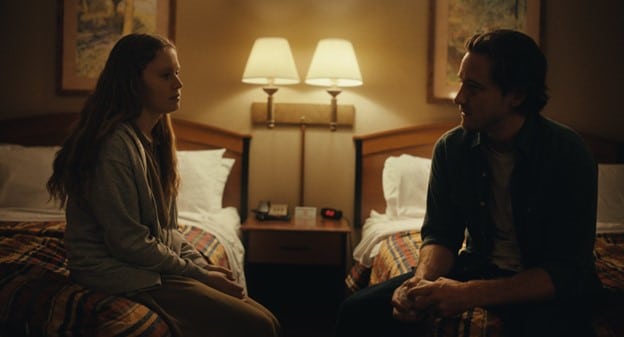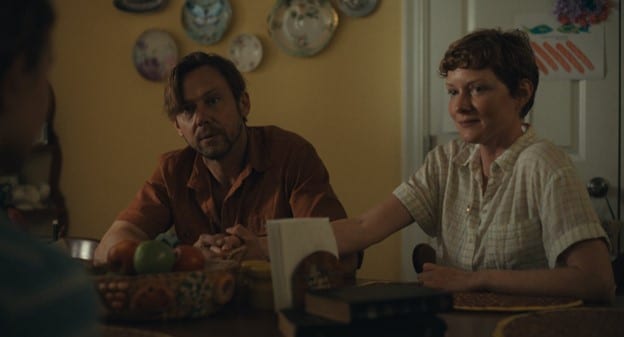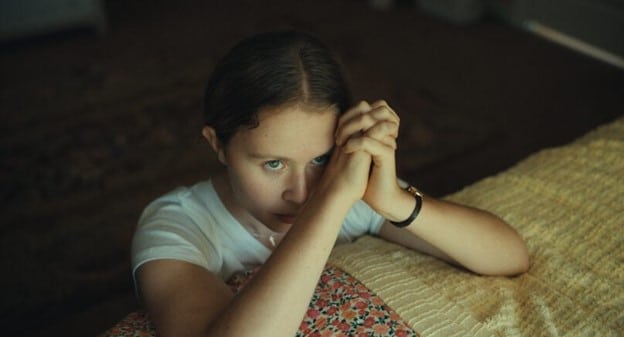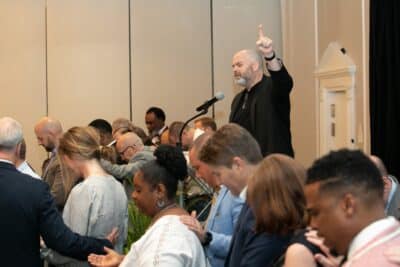In 2013, a filmmaker from Los Angeles who considers herself agnostic found herself tagging along with a group of conservative church women in Oklahoma.
The daughter of a cinematographer and costume designer who was raised on film sets, Laurel Parmet was submerged in on-site research for a short film about rodeo when she bumped into the group, who introduced her to their nondenominational church.
“When I first learned some of their more extreme beliefs, like that it’s a woman’s responsibility to not lead a man into temptation, and how they dressed, and being very aware of modesty and covering up their bodies, my first reaction was shock,” Parmet said in a recent video interview. “But then, interestingly, the more that I thought about it, I just realized how much we had in common.”
As a teen, Parmet became involved with an older man — she hesitates to call it a “relationship” — and, when it ended, came away with guilt she couldn’t explain. Listening to the women she met in Oklahoma, Parmet began to question her lingering shame over a situation in which she had clearly been taken advantage of.
“Sexual shame and seeking approval from men are really these universal experiences for women no matter how you grew up,” Parmet said. “And I wanted to tell a story, looking at this world that is extreme and specific, but is ultimately a reflection of the larger culture.”
Your tax-deductible gift helps our journalists report the truth and hold Christian leaders and organizations accountable. Give a gift of $30 or more to The Roys Report this month, and you will receive a copy of “Hurt and Healed by the Church” by Ryan George. To donate, click here.
That story became “The Starling Girl,” a feature-length film Parmet wrote and directed. Set in rural Kentucky, it follows 17-year-old Jem’s struggle to align her self-expression and sexual desires with her parent’s expectations and church’s fundamentalism. The rigid frameworks of her faith rupture when Owen, a magnetic — and married — youth pastor, returns her affections.
The film sensitively portrays both Jem and Owen, who himself is aching to escape the stifling doctrine of his pastor father and a marriage that is coming apart. He is “totally in the wrong,” Parmet said, as he wields his authority to seduce Jem. At the same time, Parmet doesn’t tame Jem’s ferocity, agency or her capacity for manipulation.
Parmet said she refused to make the film a clean-cut account of an unequal relationship.
“When abuse is framed as just black and white, it can be harder for people going through it to reckon with it and realize it. We can deny our own wounds because we think they aren’t serious enough. And that only perpetuates the problem,” said Parmet. “And so I wanted people to see how complicated it can be. The ways we can be exploited while at the same time wielding power.”

This dynamic isn’t specific to religious groups, but in “The Starling Girl,” conservative Christian teachings about male authority and women’s limited agency over their bodies show how the church makes itself susceptible to abuses of power.
Still, “The Starling Girl” isn’t a sweeping condemnation of Christianity.
“I wanted audiences to be invested in these characters, not to be watching judgmentally from afar,” Parmet explained. “The film intends to offer a more complex look at religion and faith. It maybe even suggests that there are many ways to connect with God. Maybe God lives in Jem’s questions and desires.”
The film’s embrace of gray areas puzzled some would-be partners. The fact that it “wasn’t flat out attacking Christianity” was “harder for people to understand,” said Parmet.
But producer Kara Durrett was hooked on the film as soon as she heard the concept. As the script evolved, Parmet was chosen to be a 2019 fellow in the Sundance Screenwriters Intensive. Then Parmet and Durrett attended Catalyst in 2021, a program that helped connect them to financial backers.
Meanwhile, Parmet enlisted women who had left Quiverfull and Independent Fundamentalist Baptist churches, some of them abuse victims, to help her capture the nuances of life in the nondenominational, fundamentalist community portrayed in the film. Crew members also had grown up in conservative churches, including the film’s production designer, who, Parmet said, “was just able to bring such a level of authenticity and detail to the story.”
Parmet’s well-researched, clearly defined vision also attracted Wrenn Schmidt, who plays the role of Jem’s mother, Heidi. “I feel like it’s very rare to speak to a director who has that kind of clarity, and is able to articulate it without it also feeling like that clarity is confining, for an actor,” Schmidt said.
Schmidt’s own religious background allowed her to portray the many shades of Heidi, who is in some ways an equal victim of the patriarchal system she enforces. Raised in a warm, communal Presbyterian USA church, Schmidt saw her own beliefs punctured by the provocative questions of her first boyfriend, who was an atheist. Schmidt knows both the safety of religious community and the disorienting process of questioning that community’s foundations.
The authenticity is enhanced by the film’s shooting location — a small white church outside Louisville that Parmet populated by local actors for the church scenes.
“The church was so receptive,” said Durrett. “They would have these wonderful conversations around, like, the weddings that they hosted there and what kind of incidents they’ve had at their church and why it’s important to keep telling stories, both good and bad, so we can learn from them.”
Filmed last summer, “The Starling Girl” debuted at Sundance Film Festival in January and was hastily snatched up by Bleecker Street. Early reviews have been positive, generating buzz in advance of its May 12 release.
For some, the movie has already left its mark.
“It made me think a lot about the world my daughter is growing up in,” said Schmidt. “Young girls are told to be good, nice and quiet, but are also meant to be cute, pretty and attractive. The messaging around what one should be is often very complicated.”

The movie’s portrayal of girls and women shouldering the cost of men’s actions is especially poignant, she added, in a post-Roe era.
Parmet said that her goal was to grapple with sexual exploitation, power and church abuse and to help viewers recognize where their own boundaries had been crossed so that they might “grow and heal.”
And, she said, “The Starling Girl” already seems to be doing just that.
“At festival screenings, I’ve had multiple people come up to me afterwards, people who were either survivors of abuse or who grew up in fundamentalist churches and have since left, who were very emotional and very moved by the film,” said Parmet. “It was so important to me to get that world right. And the fact that it’s speaking to people who have those backgrounds, that’s the most exciting thing to me.”
 Kathryn Post is a reporter for Religion News Service based in Pittsburgh, Pennsylvania.
Kathryn Post is a reporter for Religion News Service based in Pittsburgh, Pennsylvania.




















4 Responses
This article goes along well with the resource that you have made available this month:
She Deserves Better along with other resources available on BareMarriage.com.
Some other resources that are helpful are the Untwisting Scriptures books from Rebecca Davis.
And The Making of Biblical Womanhood by Beth Allison Barr
and Paul & Gender by Cynthia Westfall. Also, Good Boundaries and Goodbyes by Lisa Terkeurst is helpful.
I am thankful to God for you, Julie Roys. It has been a snowball effect in my life for me to have read your articles last spring about John MacArthur. I see the dangers of the typical teachings about women now and I am walking in the freedom of Christ more everyday! May a true reformation in the hearts of individuals happen as God continued to open our eyes!
““Sexual shame and seeking approval from men are really these universal experiences for women no matter how you grew up …” [Laurel Parmet].
Equally, ‘Sexual shame and seeking endorsement of experienced self are really universal experiences for boys/men no matter how you grew up.’
Fundamentalism then comes in as many variants as there are leaves on a tree.
I was impressed by the story of the film’s origins, and by the journalism that offered it up. I appreciate the subtle title of the piece, regards what it “Gets Right”, it leaving open the door to what it might get less right.
I approach Christianity in terms of meaning-making and faith on the part of its adherents, there seeking to simply see and experience the being of the other, to be impressed by what God (and all else Biblically referred to) is to them. So what others might call fundamentalists, are valued sources of ‘evidence’ of God (and all else). I don’t see why, on this interactional plane, fundamentalists cannot be tolerated alongside all other variants of being Christian.
I think that focus on fundamentalists and their nominal failings, might be allowing Christianity to not engage with a deeper/wider issue, which is how the Bible is to be understood and approached and used, and this in regards abuse (sexual and general). The suggestion here being that abuse might be inherent in the Biblical scripts as they have come down to us.
“Sexual shame and seeking approval from men are really these universal experiences for women no matter how you grew up,” Parmet said.
I think men deal with the same issues although I doubt it is a “universal experience”. I certainly have dealt with wanting approval and shame for sexual behavior outside of marriage. We grieve the Holy Spirit when we sin.
“Starling Girl” sounds like the fimmmaker is exploring the situation of clergy sexual abuse, how it happens, and how the dynamics can be complex. While keeping The Story first and foremost.
If you can make your point while keeping The Story first, that’s a theme.
If Making Your Point comes first last and always and the story is incidental, that’s Propaganda.